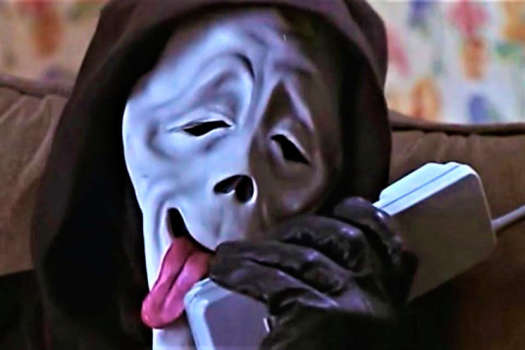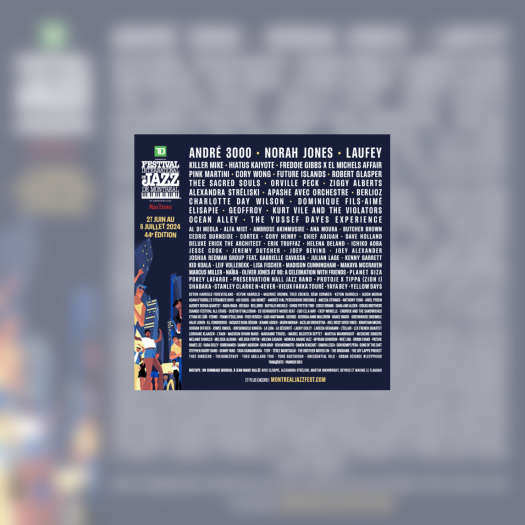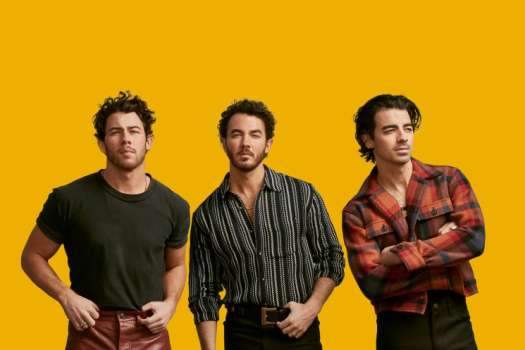Everyone's got their finger on the button. It's not just for kids, rec room stoners, coin-feeding teens or under-employed 20-somethings. Business people in suits are playing on their lunch hours. Whole families are planning day trips around them. To borrow a phrase, even educated fleas do it.
Video games are big - well, duh. But it seems there's a specific target demographic that's particularly latched on to the current explosion in joystick jiggling - musicians who have a lot of time to kill. "All I do on tour is play video games," says Fear Factory drummer Raymond Herrera. "Eight hours a day. I have three systems, cuz they overheat."
Herrera really likes his games. "When I first met the creator of Mario Bros. [Nintendo's Shigeru Miyamoto]," Herrera says excitedly, "it was like when one of my fans meets me. I was in awe." While in Toronto on a promotional tour, Herrera makes sure to make the trek to the suburbs to visit Sega Playdium. After two hours of virtual life, he ranks it as one of the best in the world, behind only Japan ("That whole country is one big video game") and Las Vegas.
He's not alone. Prodigy's Liam Howlett blamed the delay of their Fat of the Land album on his desire to see Lara Croft through to the end of Tomb Raider. Sister of Mercy Andrew Eldritch is said to be missing-in-action due to his own joystick addiction.
But musicians' involvement has extended far beyond outfitting their tour vans with state of the art consoles - many of them are participants in the ongoing revolution. Just as their graphic elements improve and three dimensional realms become more realistic, game music has morphed from chirpy background themes that could double as torture devices, to fully immersive soundtracks as complex and fully realised as the games they accompany.
Fantastic Plastic Machine
Fear Factory
It started with electronic-oriented bands, whose technological means and epic ambitions lent themselves perfectly to the medium. They still do - artists like Japan's Fantastic Plastic Machine are perfect for pumping up the adrenaline of jazzed joystick jockeys. But other bands are jumping on the bandwagon as well. Industrial-metal band Fear Factory has done more video game music, by far, than any other band: racing games (Test Drive 5, Test Drive Off Road) sports (NFL Blitz) and flight simulators (Wing Commander 4).
It's not just writing filmic scores, either. Bands from all over the map are eager to take advantage of the cross-promotional possibilities of playing with their likeness and music. In August the Wu-Tang Clan will launch their Shaolin Style, including four unreleased tracks, and your choice of Clan members to kung fu fight with and against. Cypress Hill is another crew expected to have a "stoner mode" added to their video game.
After their appearance as subjects and musicians in the Beavis and Butthead game, Gwar is planning a mythologically based one of their own. And never one to miss a bandwagon going by, David Bowie is throwing his hat into the ring - he'll be adding his voice, image and eight unreleased songs to an upcoming game.
The revolution in video game music can be traced back to Nine Inch Nails' Trent Reznor. At the height of his popularity, he wrote the music for one of the most innovative, and successful games ever. Unlike earlier video game music, his work on Quake was more like a film score, drawing people in to the first-person shooter game and keeping them there for hours (and hours). His aggressive beats and destructive sound lent themselves perfectly to the game's dark and twisted atmosphere.
Unlike other forms of music that strictly adhered to a three-minute radio friendly format, Reznor's electronic atmospheres were perfect for the subtly varied repetition that works most effectively with video games. Other electronic-oriented bands quickly followed suit; the rise in mainstream popularity of the genre coincided with their inclusion in such games, culminating in one of the first successful modern crossovers. The soundtrack to racing game Wipeout XL featured tracks from the genre's biggest names: Underworld, Orbital, Prodigy, Daft Punk, Chemical Brothers, Future Sound of London, Photek and more.
Since Quake, games and bands have turned out to be a perfect match, and has evolved into big business in a way that no one could have predicted. When Fear Factory was first asked to write some music for a game, naively, "we were happy just to be on the game," Herrera explains. "Then we wanted to be mentioned in the booklet. Then came money. Then we wanted a sticker [on the game box]." With success come some funny and unexpected perks - in Test Drive 5, Herrera's personal jeep, scattered with Fear Factory decals, is one of the vehicles players can choose to drive.
A lot has changed from the days when Negativland's Mark Hosler toiled away as a music programmer for Epyx in the mid-'80s - creating snippets of national anthems for their Summer and Winter Olympics games. "Music quality is a major part of the game," Herrera says. "It's gone from being five percent of a game, to 50 percent."
"It's not like Pac-Man," says Tomoyuki Tanaka, aka Fantastic Plastic Machine, about his next project, a score for the upcoming Toyko Bomb game. "When you try to defuse the bomb," Tanaka explains through a translator, "the music is synth driven. I want a drum & bass tempo." Tanaka's vision is a perfect example of how music is serving to change the face of video game play - as the tension mounts, and the time runs out on the player, the tempo increases.
Game music is no longer limited to atmospheric electronica or hard-nosed industrial - snowboarding game Big Air features ten different punk bands, including Leatherface, Snuff, Blink 182, Diesel Boy, Limp, and a customisable jukebox so players can choose their own musical adventure while they play.
To say that video games are big business is like saying some people like Lara Croft. For Sony it's the biggest business. Playstation - not audio/visual electronics, music nor films - is its cash cow.
It is changing the face of youth consumerism. German music retailers are blaming poor record sales on video games - youth just aren't interested in music anymore, they claim. The Japanese music market has seen a flush of soundtracks based on popular games like Zelda and Final Fantasy. And game company Accolade is considering releasing a Test Drive 6 soundtrack as a bonus CD with the game.
Cross-promotional tie-ins between video games and movies or music are not new - they've just never been this successful before. In the first wave boom of home video games, lots of films became video games - most, like the "build the phone" E.T. game, were ill-conceived disasters. Pac-Man's popularity led to a single "Pac-Man Fever," and album that featured other bad synth pop songs inspired by video games of the time. It was also a Saturday morning cartoon, a breakfast cereal, and a highly successful sequel game - Ms. Pac-Man (in all seriousness) struck a hard fought blow for feminism in the trenches of male-dominated arcades, and paved the way for the likes of Lara Croft.
The competition is stiff, and not just between big guns Nintendo, Sony and Sega - video games are also competing for attention with television, movies, music and (albeit to a lesser extent) actually getting out of the house and interacting with other humans. And every competing medium is riffing on what works. Everywhere you look, someone's selling the clothing line inspired by the soundtrack for the movie based on the video game - it's difficult to decipher the cart from the horse.
Another series of radical changes is just over the horizon. This fall, Sega will launch its next attack on the home market with its Dreamcast system. Sony is responding with the next step up - a console based on the burgeoning Digital Video Disc (DVD) technology. Fearing a loss of the market share established with its N64 system, Nintendo announced project Dolphin, its own DVD-based platform. With these constant improvements in video and sound, what else can you say? Let the games begin.
Video games are big - well, duh. But it seems there's a specific target demographic that's particularly latched on to the current explosion in joystick jiggling - musicians who have a lot of time to kill. "All I do on tour is play video games," says Fear Factory drummer Raymond Herrera. "Eight hours a day. I have three systems, cuz they overheat."
Herrera really likes his games. "When I first met the creator of Mario Bros. [Nintendo's Shigeru Miyamoto]," Herrera says excitedly, "it was like when one of my fans meets me. I was in awe." While in Toronto on a promotional tour, Herrera makes sure to make the trek to the suburbs to visit Sega Playdium. After two hours of virtual life, he ranks it as one of the best in the world, behind only Japan ("That whole country is one big video game") and Las Vegas.
He's not alone. Prodigy's Liam Howlett blamed the delay of their Fat of the Land album on his desire to see Lara Croft through to the end of Tomb Raider. Sister of Mercy Andrew Eldritch is said to be missing-in-action due to his own joystick addiction.
But musicians' involvement has extended far beyond outfitting their tour vans with state of the art consoles - many of them are participants in the ongoing revolution. Just as their graphic elements improve and three dimensional realms become more realistic, game music has morphed from chirpy background themes that could double as torture devices, to fully immersive soundtracks as complex and fully realised as the games they accompany.
Fantastic Plastic Machine
Fear Factory
It started with electronic-oriented bands, whose technological means and epic ambitions lent themselves perfectly to the medium. They still do - artists like Japan's Fantastic Plastic Machine are perfect for pumping up the adrenaline of jazzed joystick jockeys. But other bands are jumping on the bandwagon as well. Industrial-metal band Fear Factory has done more video game music, by far, than any other band: racing games (Test Drive 5, Test Drive Off Road) sports (NFL Blitz) and flight simulators (Wing Commander 4).
It's not just writing filmic scores, either. Bands from all over the map are eager to take advantage of the cross-promotional possibilities of playing with their likeness and music. In August the Wu-Tang Clan will launch their Shaolin Style, including four unreleased tracks, and your choice of Clan members to kung fu fight with and against. Cypress Hill is another crew expected to have a "stoner mode" added to their video game.
After their appearance as subjects and musicians in the Beavis and Butthead game, Gwar is planning a mythologically based one of their own. And never one to miss a bandwagon going by, David Bowie is throwing his hat into the ring - he'll be adding his voice, image and eight unreleased songs to an upcoming game.
The revolution in video game music can be traced back to Nine Inch Nails' Trent Reznor. At the height of his popularity, he wrote the music for one of the most innovative, and successful games ever. Unlike earlier video game music, his work on Quake was more like a film score, drawing people in to the first-person shooter game and keeping them there for hours (and hours). His aggressive beats and destructive sound lent themselves perfectly to the game's dark and twisted atmosphere.
Unlike other forms of music that strictly adhered to a three-minute radio friendly format, Reznor's electronic atmospheres were perfect for the subtly varied repetition that works most effectively with video games. Other electronic-oriented bands quickly followed suit; the rise in mainstream popularity of the genre coincided with their inclusion in such games, culminating in one of the first successful modern crossovers. The soundtrack to racing game Wipeout XL featured tracks from the genre's biggest names: Underworld, Orbital, Prodigy, Daft Punk, Chemical Brothers, Future Sound of London, Photek and more.
Since Quake, games and bands have turned out to be a perfect match, and has evolved into big business in a way that no one could have predicted. When Fear Factory was first asked to write some music for a game, naively, "we were happy just to be on the game," Herrera explains. "Then we wanted to be mentioned in the booklet. Then came money. Then we wanted a sticker [on the game box]." With success come some funny and unexpected perks - in Test Drive 5, Herrera's personal jeep, scattered with Fear Factory decals, is one of the vehicles players can choose to drive.
A lot has changed from the days when Negativland's Mark Hosler toiled away as a music programmer for Epyx in the mid-'80s - creating snippets of national anthems for their Summer and Winter Olympics games. "Music quality is a major part of the game," Herrera says. "It's gone from being five percent of a game, to 50 percent."
"It's not like Pac-Man," says Tomoyuki Tanaka, aka Fantastic Plastic Machine, about his next project, a score for the upcoming Toyko Bomb game. "When you try to defuse the bomb," Tanaka explains through a translator, "the music is synth driven. I want a drum & bass tempo." Tanaka's vision is a perfect example of how music is serving to change the face of video game play - as the tension mounts, and the time runs out on the player, the tempo increases.
Game music is no longer limited to atmospheric electronica or hard-nosed industrial - snowboarding game Big Air features ten different punk bands, including Leatherface, Snuff, Blink 182, Diesel Boy, Limp, and a customisable jukebox so players can choose their own musical adventure while they play.
To say that video games are big business is like saying some people like Lara Croft. For Sony it's the biggest business. Playstation - not audio/visual electronics, music nor films - is its cash cow.
It is changing the face of youth consumerism. German music retailers are blaming poor record sales on video games - youth just aren't interested in music anymore, they claim. The Japanese music market has seen a flush of soundtracks based on popular games like Zelda and Final Fantasy. And game company Accolade is considering releasing a Test Drive 6 soundtrack as a bonus CD with the game.
Cross-promotional tie-ins between video games and movies or music are not new - they've just never been this successful before. In the first wave boom of home video games, lots of films became video games - most, like the "build the phone" E.T. game, were ill-conceived disasters. Pac-Man's popularity led to a single "Pac-Man Fever," and album that featured other bad synth pop songs inspired by video games of the time. It was also a Saturday morning cartoon, a breakfast cereal, and a highly successful sequel game - Ms. Pac-Man (in all seriousness) struck a hard fought blow for feminism in the trenches of male-dominated arcades, and paved the way for the likes of Lara Croft.
The competition is stiff, and not just between big guns Nintendo, Sony and Sega - video games are also competing for attention with television, movies, music and (albeit to a lesser extent) actually getting out of the house and interacting with other humans. And every competing medium is riffing on what works. Everywhere you look, someone's selling the clothing line inspired by the soundtrack for the movie based on the video game - it's difficult to decipher the cart from the horse.
Another series of radical changes is just over the horizon. This fall, Sega will launch its next attack on the home market with its Dreamcast system. Sony is responding with the next step up - a console based on the burgeoning Digital Video Disc (DVD) technology. Fearing a loss of the market share established with its N64 system, Nintendo announced project Dolphin, its own DVD-based platform. With these constant improvements in video and sound, what else can you say? Let the games begin.




